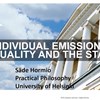roughly

Bayesian and non-Bayesian epistemic attitudes and existential risk
In this talk Olle Häggström will sketch and contrast two different epistemic attitudes that roughly correspond to Bayesianism and Popperian falsificationism. He will argue that they both have virtues
Implicit Gender Bias
In Duarte, M., Losleben, K. & K. Fjörtoft (red.) Gender Diversity, Equity, and Inclusion in Academia. Routledge. Abstract This chapter explores the phenomenon of implicit gender bias within a higher
Extended Preferences and Interpersonal Comparisons of Well‐being
Philosophy and Phenomenological Research. Published online 7 November 2016. doi.org/10.1111/phpr.12334 Abstract An important objection to preference‐satisfaction theories of well‐being is that these the
Belief Revision for Growing Awareness
Mind 130(520), 2021 Abstract The Bayesian maxim for rational learning could be described asconservative changefrom one probabilistic belief orcredencefunction to another in response to new information. ). But can this conservative-change maxim be extended to revising one’s credences in response to entertaining propositions or concepts of which one was previously unaware? The economists,) make a proposal in this spirit. Philosophers have adopted effectively the same rule: revision in response to growing awareness should not affect the relative probabilities of propositions in one’s ‘old’ epistemic state. The rule is compelling, but only under the assumptions that its advocates introduce. It is not a general requirement of rationality, or so we argue. We provide informal counterexamples. And we show that, when awareness grows, the boundary between one’s ‘old’ and ‘new’ epistemic commitments is blurred. Accordingly, there is no general notion of conservative change in this setting.
Weighing Absolute and Relative Proportionality in Punishment
in Tonry, M. (ed.) Of One-eyed and Toothless Miscreants: Making the Punishment Fit the Crime? Oxford: Oxford University Press. Abstract Conflicts between relative and absolute proportionality are an imp
Graham Oddie: What’s so bad about adaptive preferences?
Graham Oddie, Professor of Philosophy, University of Colorado Boulder Abstract Our desires and preferences change, but one particular kind of change in preferences has been singled out for opprobrium—so
POSTPONED! - New date November 25 - Olle Häggström: Bayesian and non-Bayesian epistemic attitudes (webinar)
THIS SEMINAR IS POSTPONED - New date November 25 Olle Häggströmis professor of mathematical statistics at Chalmers University of Technology, researcher at the Institute for Futures Studies and a board
Olle Häggström: Bayesian and non-Bayesian epistemic attitudes, with applications to the atomic bomb, artificial intelligence, covid-19 and existential risk (webinarium)
Olle Häggströmis professor of mathematical statistics at Chalmers University of Technology, researcher at the Institute for Futures Studies and a board member of the Royal Swedish Academy of Sciences
Research seminar with Johanna Rickne: The Class Ceiling in Politics
Venue: Institutet för framtidsstudier, Holländargatan 13, 4th floor, Stockholm, or online.Research seminar with Johanna Rickne, professor of Economics at SOFI, Stockholm University.Register hereAbstracPrior studies have documented that working-class individuals rarely become parliamentarians. We know less about when in the career pipeline to parliament workers disappear, and why. We study these questions using detailed data on the universe of Swedish politicians’ careers over a 50-year period. We find roughly equal-sized declines in the proportion of workers on various rungs of the political career ladder ranging from local to national office. We reject the potential explanations that workers lack political ambition, public service motivation, honesty, or voter support. And while workers’ average high school grades and cognitive test scores are lower, this cannot explain their large promotion disadvantage, a situation that we label a class ceiling. Organizational ties to blue-collar unions help workers advance, but only to lower-level positions in left-leaning parties. We conclude that efforts to improve workers’ numerical representation should apply throughout the career ladder and focus on intra-party processes.

Säde Hormio: Individual emissions, equality and the state
Seminar with Säde Hormio, researcher in Practical Philosophy at the University of Helsinki. ABSTRACT The amount of greenhouse gases that can still be emitted to the atmosphere is very limited if global








